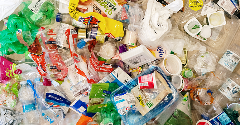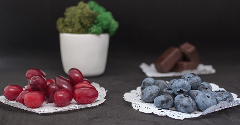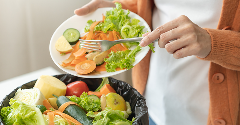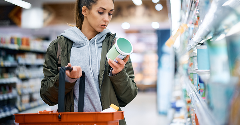Euromonitor: COVID-19 bolsters local food production in the Middle East
17 Apr 2020The Gulf Cooperation Council (GCC) region and other Middle Eastern countries have built a food economy that relies heavily on imports for non-perishable goods. However, due to supply chain constraints engendered by the COVID-19 pandemic, the region has been pushed to source more locally-produced products, according to research from Euromonitor.
Euromonitor reported that local manufacturers can take advantage of a consumer predisposition for purchasing non-perishable goods. As is the case for many other countries, the pandemic has bolstered sales in the non-perishable packaged food sector within the Middle East. These turbocharged sales are fueled by fears that global manufacturing will falter. At the same time, Euromonitor's research confirmed that pricing for imported products is not spiking as some predictions outlined.

To tap into this market for non-perishables, local companies within the GCC can position themselves to promote the longevity of their products like UHT milk and frozen food, which are not typically viewed as essential but could help consumers stock their pantries as international supply chains struggle to keep up. Euromonitor noted that the snacks category is benefitting particularly well from the changes in consumer demand and it forecast the segment to continue growing as consumers stay inside with restricted movement.
While local producers can capitalize on consumer demand for non-perishables, monthly price charts from Euromonitor show that international imported goods are not suffering from price hikes. “On the contrary, we can even expect some softening due to the strong US dollar, which could potentially make imported goods cheaper,” according to the report. Many GCC currencies are pegged to the U.S. dollar which has seen an increase in strength in recent weeks.
Still, prices have fluctuated. For the month ending on March 22, price chats show that condiments, dairy, confectionery and breakfast cereals have increased in median price in the United Arab Emirates. Snack bars, rice, pasta and ready meals have decreased in price. Soup and edible oils have held steady.
To help alleviate the economic effects of COVID-19 on retail, Euromonitor pointed out the opportunity presented by e-commerce. Research from Euromonitor International’s Digital Connectivity Index shows that e-commerce sales have grown steadily in the United Arab Emirates since 2009. In addition, the country is now ranked 14th globally in both fixed and mobile broadband and has developed a blockchain ecosystem to facilitate secure payment solutions. With such capabilities in place, e-commerce can make up the loss in foot traffic caused by quarantine measures and can help facilitate the localization of supply chains. For agile retailers and foodservice purveyors, this channel offers the chance to continue serving consumers through localized partnerships for sourcing products and serving locally-made home delivery from restaurants.
Related news

Plastic packaging reduction requires industry rethink
6 Jan 2023
The food and beverage sector is calling for industry-wide collaboration and business model updates to reduce the environmental impact of plastic packaging.
Read more
Misleading nutrition claims mask true sugar levels in baby food
5 Jan 2023
Some baby and toddler food and drink products, sweetened with fruit concentrate, contain up to four teaspoons of sugar per serving yet are marketed as having ‘no added sugar’, according to a survey by Action on Sugar.
Read more
Asian beverage brands deal with rising costs
4 Jan 2023
Decreasing bottle sizes or increasing prices? Asian beverage brands are finding “creative approaches” to manage rising costs, according to industry analysts.
Read more
Preserving the freshness of food to fight waste
3 Jan 2023
Several companies are producing products that absorb ethylene, the hormone that causes food to ripen, in attempt to reduce food waste.
Read more
Value-seeking US consumers cut back on food spending
2 Jan 2023
Cheaper items, smaller sizes, and shorter grocery lists: inflationary effects coupled with a global long-term recession are set to continue shaping food spending habits, according to a recent Rabobank report.
Read more
Opportunities grow for lower-caffeine coffee
23 Dec 2022
Many consumers want the mental focus of caffeine without the jitters, prompting a wave of product development such as “half caffeine” ground coffee or ready-to-drink (RTD) cold brew blended with relaxing botanicals.
Read more
Superfrau upcycles liquid whey for energy drinks
22 Dec 2022
US company Superfrau turns surplus whey into sustainable, upcycled-certified dairy products for the recovery drinks market.
Read more
Malaysian brand Nanka brings jackfruit range to Europe
21 Dec 2022
Malaysian brand Nanka is expanding to new Asian and European markets with its fast and ready-to-eat plant-based products based on jackfruit.
Read more
Is the UK on target to meet its 2025 Plastics Pact?
20 Dec 2022
Major food industry players, including Arla, Kerry, PepsiCo and TerraCycle, have signed the UK’s voluntary Plastic Pact to reduce plastic from the supply chain – but are they on track to meet their targets?
Read more
Ammonia emissions, Oreo cookies, and Olam
19 Dec 2022
Olam Food Ingredients (Ofi) and Mondelēz are under fire for using ammonium carbonate, an authorised food additive, in cocoa and Oreo cookies - but the accusations stem from greater concerns over industrial emissions of toxic ammonia and nitrogen oxide ...
Read more